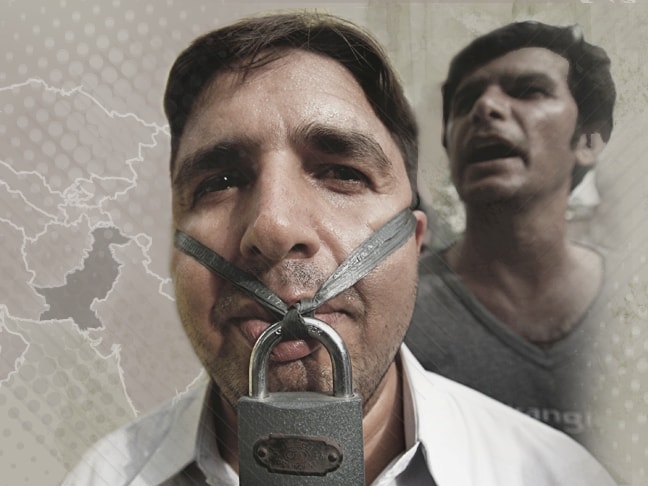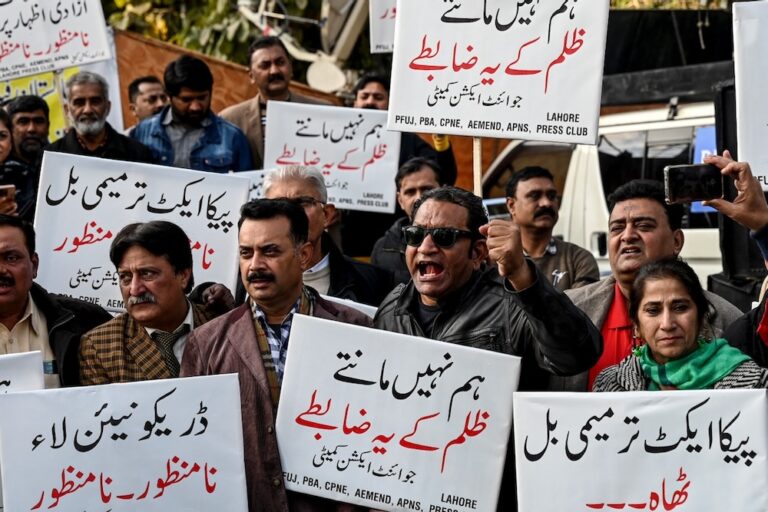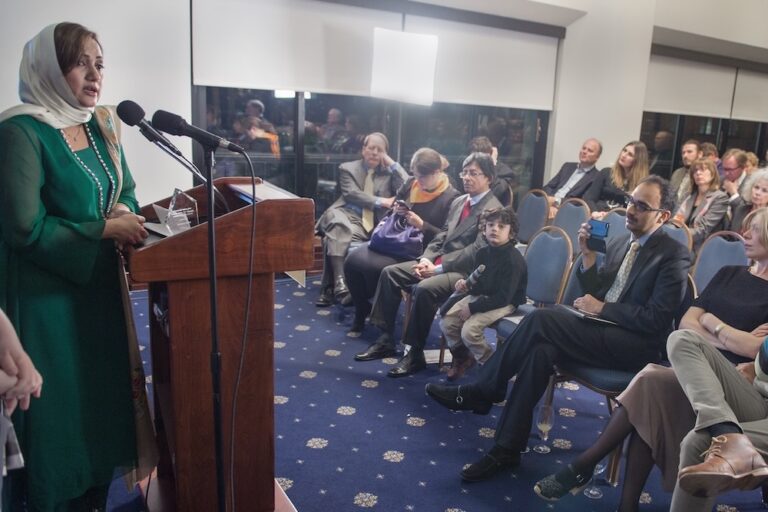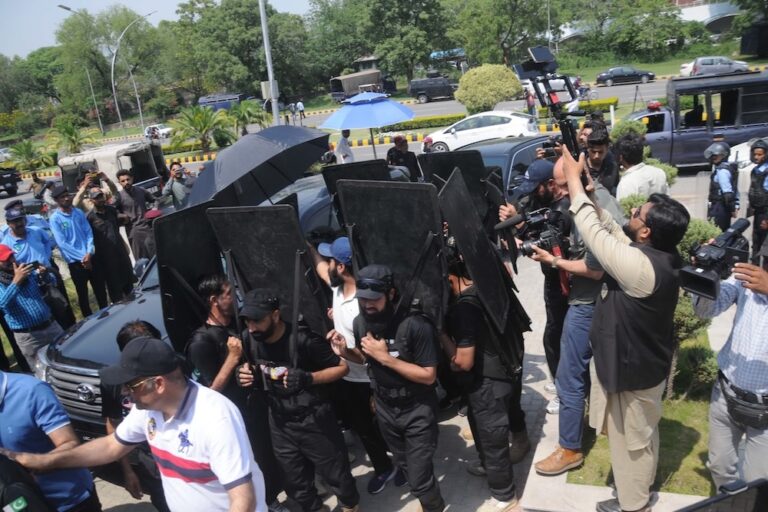Three experts reflect on what impunity looks like, and how to end it in Pakistan. Take action now by sending a letter to the government of Pakistan to ensure the UN plan for protecting journalists and combating impunity is implemented.
Pakistan has one of the worst records in the world for allowing crimes against free expression to go unpunished. We asked three individuals working at the forefront of the battle against impunity to share their insights.
A. Rehman [AR] is the Secretary General of the Human Rights Commission of Pakistan (HRCP). Besides monitoring human rights violations and seeking redress through public campaigns, lobbying and intervention in courts, HRCP organises seminars, workshops and fact-finding missions. Rehman has had an extensive career in journalism spanning five decades, including positions at the Pakistan Times and Weekly Viewpoint.
Owais Aslam Ali [OA] is the Chairman of Pakistan Press International. Since 1992, he has been secretary general of the Pakistan Press Foundation (PPF), an independent media research and documentation centre committed to raising the standards of journalism and promoting and defending freedom of expression in Pakistan, and internationally.
Shahzad Ahmad [SA] is the Country Director of Bytes for All, Pakistan, an international human rights organisation with a focus on Information and Communication Technologies (ICTs) for development, democracy and social justice. He is a specialist in digital security, social media ethics and the strategic use of technology for communications, and contributes to publications and research on ICTs for development, freedom of expression and gender related issues.
The experts respond
How does impunity affect freedom of expression in Pakistan?
AR: Impunity poses one of the most serious challenges to the rule of law in Pakistan and to citizens’ basic rights. Officials almost always get away with extra-judicial killings. Enforced disappearances are a major issue here, and no state functionary has been prosecuted. Illegal detention, torture, extortion are common. People who work in media are particularly vulnerable to attacks aimed at silencing them, and the culprits are inside and outside of the government.
SA: Many state authorities as well as non-state actors in Pakistan enjoy impunity, and nearly all of them are opposed to the ideals of freedom of expression. The army and intelligence agencies, for instance, have been known to silence journalists through coercion and other tactics, yet no actions are instigated against the individuals who order these illegal, unconstitutional acts. Vague laws, court jurisdiction issues and weakening writ of the government in several conflict areas contribute to their impunity. Similarly, the religious right has been flouting, criticising and forcefully curtailing freedom of expression in Pakistan by imposing pressure tactics on the authorities. The murder of Punjab governor Salman Taseer, assassinated by his own security guard who disagreed with his opposition to Pakistan’s blasphemy law, is a vivid reminder that if you express religious beliefs that differ from the religious right, they will silence you, one way or another. Terrorists pose yet another threat which hangs heavy on free speech. And all of these actors enjoy impunity.
OA: According to figures compiled by Pakistan Press Foundation (PPF), 55 journalists have been killed in the line of duty in Pakistan in the last ten years, and 36 of them were deliberately targeted and murdered because of their work. For every journalist who has been deliberately targeted and murdered, there are many others who have been injured, threatened and coerced into silence. Sadly, the perpetrators of violence against journalists and media workers enjoy almost absolute impunity in Pakistan. This is seriously hampering press freedom in the country.
The alarming increase in violence and threats has forced many journalists to migrate from these danger zones, and intimidation has forced others to self-censor, particularly in the conflict areas. Because of this, reports about military action by Pakistani law enforcement agencies, drone attacks by the US forces or attacks by militants are largely based on press releases and not on observations by independent journalists.
How has the culture of impunity affected the work of the Human Rights Commission of Pakistan?
AR: Human rights defenders face serious challenges. Three activists working for the Human Rights Commission of Pakistan (HRCP) have been killed. Two have had to be relocated. Documents leaked by Edward Snowden revealed plans to kill HRCP leader Asma Jahangir. Right now several Karachi-based media persons are trying to escape threats from a militant-political party. The murder of Saleem Shahzad, a Pakistani investigative journalist who wrote widely for European and Asian media, was probed by a commission, but no criminal was named. Most inquiries are mere eyewash. The suspected perpetrators in most cases are military intelligence, civil intelligence, police. the Taliban and other militant organisations, the armed wings of political parties in Karachi, and of course smugglers and drug traffickers.
While impunity affects everyone, Pakistan is known as one of the most dangerous places in world to be journalist, in particular. Why are journalists targeted, and by whom?
OA: In such a violently polarised atmosphere, everything becomes controversial, whether it is education for girls or Polio vaccinations. However, security issues remain the biggest threat for journalists. Because of the Afghanistan war, the so-called “war on terror”, and a simmering separatist movement, Khyber Pakhtunkhwa, FATA (Federally Administrated Tribal Agencies) and Balochistan are the most dangerous areas for journalists. Of the 55 journalists killed in the line of duty since 1994, 42 were working in one of these regions. In terms of who the perpetrators are, because of the lack of credible, independent investigations, the murders remain shrouded in mystery, with allegations being made against the usual suspects – militant groups, intelligence agencies and separatists.
Do women reporters face different types of risks?
OA: Reporting, especially in rural and conflict areas, remains almost exclusively a male domain. The situation in the newly emerging television sector is slightly better, as women who report for television are accompanied by a team including camerapersons and producers, which provides more security. Still, Eve teasing – the public sexual harassment or molestation of women by men – is endemic in Pakistan society. Neither media employers, unions or press clubs have gone much beyond empty lip service to promote the sense of safety that would encourage women to enter the field of reporting in substantial numbers.
Are there digital spaces where people can safely express themselves?
SA: Expression in digital spaces is curtailed by the authorities, using excuses like national security, morality and religious harmony. For instance, some Facebook pages have thousands of followers and openly talk about a liberal Pakistan, caustically criticising the religious mindset at the same time. However, such pages have been repeatedly blocked by the authorities. The consequences of expressing yourself on the Internet can be dire. In a recent incident, a lecturer was targeted over his atheistic beliefs, which he expressed online. He was then charged with blasphemy and barely avoided lynching at the hands of a mob. Eventually he was jailed, and remains there today. The government has launched a campaign against what it considers online blasphemy, content against national security, morals or criticism of authorities – especially the military or other law enforcing agencies. With the state hell-bent on buying sophisticated filtering and surveillance tools online, authorities can easily identify users who indulge in a narrative that is unacceptable to the state. This eventually limits digital spaces for free expression.
How has this culture of impunity directly affected Bytes for All?
SA: We have faced many threats for standing up for free expression in the country. Phone tapping, surveillance, visits from intelligence agencies and threats of severe consequences from the religious right were already frequent, and increased after we lodged a petition against the government for violating freedom of expression by restricting access to many websites in Pakistan. The situation further deteriorated when, in another petition, Bytes for All challenged the government on their use of FinFisher – a draconian surveillance tool. A smear campaign was initiated to label us as traitors, anti-Pakistan, agents of the west and anti-Islam. State authorities and the religious right consider this a threat to popular discourse, so they view the work of Bytes for All as treasonous, and against the national interest.
Is there a local movement within Pakistan to end the culture of impunity?
SA: Conventionally, one would expect the media to lead such a campaign. But the media observes its own no-go areas, and has played dumb in many cases, even glossing over the deaths of its own reporters when major players are involved. Civil society is spearheading a sub-movement, which focuses on the YouTube ban and can be categorised as an effort to end the culture of impunity. Nonetheless, the effort is small-scale and needs to be amplified, which is only possible with the direct involvement of media, political parties, judiciary and other stakeholders.
AR: Protests are made by those affected by official excesses or by atrocities by non-state actors, but there is no movement to end the culture of impunity as such. The Supreme Court has taken suo motu [legal term meaning “on its own motion”] notice of many cases, but it has not been able to make much of a difference.
What about the international community? Can initiatives like the UN Plan of Action help?
AR: In Pakistan, our officialdom can tire out UN Rapporteurs, but they do keep raising matters, which is important. Initiatives like the UN Plan of Action can help, as long as there is meaningful civil society support from within Pakistan.
SA: Initiatives such as the UN Plan of Action are certainly a beacon towards which a country may strive, but what Pakistan needs is an indigenous will to preserve freedom of expression. Unless the local media join hands to overturn impunity, the international community may not be able to help much in Pakistan. The UN Plan of Action can prove effective only if the government is forced to abide by it.
OA: Increasing violence against the media has impelled PPF to work even harder with both national and international media organisations. In March 2013, we played our due role at the International Conference on Safety and Security of Pakistani Journalists: Promoting Collaborative Approaches to Combat Impunity, which resulted in the formation of the Pakistan Coalition on Media Safety (PCOMS). PCOMS supports the UN Action Plan Against Impunity as well as its focus on Pakistan as one of the pilot countries, and aims to help, support and reinforce its implementation. I believe this coalition marks an important development in the fight against impunity for those who attack media professionals and institutions. It will act as a coordinating body, mapping the various safety initiatives, providing a forum to coordinate efforts, and helping us all work towards a single outcome. PPF also agreed to host the Secretariat of PCOMS.
What is the solution to ending impunity in Pakistan?
AR: Ending impunity in Pakistan is going to be a long haul. First, the cycle of military intervention and disruption of constitutional order must end. The so-called war on terror and the operations of militant groups have undermined the rule of law. The process must be reversed. The intelligence agencies will have to be made subject to law and accountability. The subordinate judiciary has to be purged of corrupt elements. The police and other law-enforcing services need to be sensitised to civilised laws and human rights. And the whistleblowers need to be protected. Witnesses, too.
SA: We believe the practical way to end impunity in Pakistan is to make authorities more accountable. Weak laws and other issues in certain conflict areas are also predatory to freedom of expression, and further strengthen impunity. Pakistan’s law enforcement agencies, judicial system and executive branch need to work together with a strong political will to end impunity.
As per their international obligations, the government should honour the commitment it made at the October 2012 Universal Periodic Review and establish a National Human Rights Commission with a mandate to investigate cases and bring the culprits to justice. To date, the government has not moved an inch in the direction of achieving this.
Civil society organisations, media professionals and digital rights activists must continue to monitor with a keen eye instances where freedom of expression is curtailed, and raise strong voices against it.
Also, the international community must continue to pressure both the media and the government in Pakistan to ensure the UN Plan of Action is implemented. While due legal process is gaining traction in Pakistan, and the judiciary has been able to tackle the army in some instances, proper legislation and legal process will help bring even powerful institutions to justice.
And finally, these issues must be raised strongly at the UN Human Rights Council, to make the government more accountable.
OA: PPF believes that many steps are essential to end impunity for those who attack journalists and media workers, including:
1. Criminal cases should be registered, investigated and prosecuted against the perpetrators of violence against media.
2. An independent commission comprising professional media organisations, community service organisations, press freedom and human rights organisations and professional bodies of lawyers should be established for monitoring criminal investigations and legal follow-up of cases of violence and intimidation of journalists.
3. Local, national and international print, electronic and online media should ensure long-term follow-up of cases of assault on media organisations and workers.
4. Threats and attacks can be reduced to some extent by adopting a professional approach and impartial and unbiased reporting. Journalists, especially those in rural areas, should be given training in writing skills, language proficiency, editing and interviewing techniques to enhance their capabilities.
5. There is a need for media organisations to develop ‘operating procedures’ with law enforcement agencies that will allow journalists to cover conflict situations with greater safety.
6. At times, insensitive and misinformed editors push their reporters and photojournalists into situations where they have to put their life and well-being at risk to get stories. There is a need to create awareness and sensitise the owners and editors to the realities and threats being faced by journalists, especially those working in conflict areas.
Call on the government of Pakistan to implement the UN Plan of Action on the Safety of Journalists and the Issue of Impunity.
The letter
To: Hon. Pervez Rashid, Minister for Information and Broadcasting in Pakistan
Prime Minister Nouri al-Maliki of Iraq
Prime Minister Khil Raj Regmi of Nepal
Mr. Mustafa Biong Majak Koul, Director General of Information, South Sudan
11 November 2013
Your Excellencies,
As we mark the upcoming International Day to End Impunity on 23 November, we would like to draw your attention to the UN plan to protect journalists and combat impunity and ask you to implement it in your country. In its initial phase, the plan will be implemented in Iraq, Nepal, Pakistan and South Sudan.
The scale and number of attacks on journalists and media workers around the world, combined with failures to investigate and prosecute crimes against them, have each contributed to the unacceptably high level of personal risk that journalists and others continue to face simply for exercising their right to free expression. In response, the United Nations has developed an approach called the UN Plan of Action on the Safety of Journalists and the Issue of Impunity.
The plan is a set of objectives, principles and actions developed by UNESCO’s member states and endorsed by the UN Chief Executives Board on 12 April 2012, intended to directly address the problem of journalists’ safety and the problem of impunity.
The plan is designed to uphold the fundamental right of freedom of expression, which ensures that citizens are well informed and able to actively participate in society. It aims to do this by creating a free and safe environment for journalists and media workers, including social media producers, in two ways: by introducing mechanisms designed to reduce the danger — both in conflict and non-conflict situations — and by strengthening the legal mechanisms available nationally, regionally and globally, that support the right to freedom of expression and information.
The problem exists at many levels, and so too must the solution. The plan is designed to include all stakeholders. It incorporates roles for governments, non-governmental organisations, academics, the media, and others working at global, regional, national and local levels, and its success will depend on the full participation of all.
Please help by implementing the following relevant aspects of the plan:
• Raising awareness among citizens about the consequences when journalists have their right to free expression curtailed.
• Helping governments develop laws to safeguard journalists.
• Providing training courses for journalists.
• Establishing real-time emergency response mechanisms.
• Strengthening the safety of journalists in conflict zones.
• Sensitising member states, journalists, media owners, policy makers, news organisations, editors and journalists on the growing dangers and emerging threats to media professionals and non-state actors.
Thank you for your attention and we look forward to a response.



